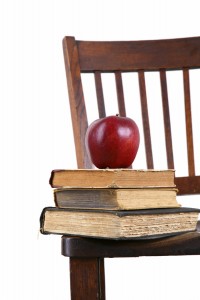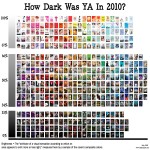Lately I’ve been thinking a lot about educational content. What does it mean exactly for something to be “educational” and how do we know if something is “educational” or not? Back when I worked in toys, there were a lot of buzz words we used for marketing including that catch-all term: developmentally appropriate. But really, what does all this mean?
When I wrote my Master’s Thesis for my psychology degree, I operated under the assumption that all toys and books are “educational” in the sense that kids can learn something from just about anything. The question isn’t whether they’re learning something, but what they’re learning exactly.
Kids might learn colors and letters from alphabet blocks, but they may lessons about body image from fashion dolls. They might learn their numbers by watching some TV programs but they might learn from superhero cartoons that it’s OK to hurt people if your intentions are good.
Don’t get me wrong; I’m not placing value-judgements here. I’m not saying some toys/books/TV shows are good and some are bad. I just think we as writers need to be aware that kids will learn many things from our books. That being the case, let’s make sure they learn what we intended and not some other hidden message that we didn’t mean to convey. Books don’t need to have a “message” in order to convey one. The important thing is that we create our work with our eyes open, aware that kids will learn from just about anything.
I’ve discovered a couple of books that make learning fun and are able to hide the educational “message” rather effectively. I’ll be discussing these books over the next few weeks so stay tuned. In the meantime, I want to hear your take: What do you think of “educational” toys/books/TV shows? Are some things more “educational” than others?
And if you’re a parent or teacher, do you limit which toys/books/TV shows your kids are exposed to? Why or why not?
Is limiting books that kids read the same as censorship? Why or why not?







 Call me Gabi (pronounced gah-BEE). I'm a writer, freelance teacher, and a lover of books and words. I'm also the instigator of DIY MFA. iggi's my sidekick, but he thinks he's the brains behind this operation.
Call me Gabi (pronounced gah-BEE). I'm a writer, freelance teacher, and a lover of books and words. I'm also the instigator of DIY MFA. iggi's my sidekick, but he thinks he's the brains behind this operation.
 Goodbye is for Sissies
Goodbye is for Sissies YA Cafe: What YA Book are You Thankful For?
YA Cafe: What YA Book are You Thankful For? YA Cafe: Why I Love Dark YA
YA Cafe: Why I Love Dark YA YA Cafe: YA Appreciation Month
YA Cafe: YA Appreciation Month
Comments on this post
I kept thinking someone else would surely have a comment to make because I am just exploding with thoughts.
What do you think of “educational” toys/books/TV shows? Are some things more “educational” than others?
I think practically everything can be educational if there is someone inspired enough to teach on hand. Sometimes, that also means stepping back and allowing the child to find the teachable moment, rereading the same story again and again because the story is hearing something they want or need to hear more than once, and answering questions openly and honestly. Even an educational item can lose its value if not enjoyable to a child or if a parent or teacher is not there to initiate some exploration. Hand a child several sheets of tissue paper and maybe some tearing or crumpling will occur but hold layers up to a window and the child can see how red and yellow make orange, or an older child can ponder how stained glass windows are designed which can then lead to a discussion of the symbolic meanings of images and colors and . . . See what I mean about how my mind began exploding with thoughts?
And if you’re a parent or teacher, do you limit which toys/books/TV shows your kids are exposed to? Why or why not?
I never limited anything but TV. I only allowed my children to watch Sesame Street once a week but that’s because I grew up without one and didn’t believe they needed PBS to teach them to read. I didn’t go out of my way to buy toys I disliked but I would use toys given to explore other things. From Teenage Mutant Ninja Turtles, my children learned about samurai and traditional Japanese weaponry, the Italian Renaissance which naturally led to learning about the English Renaissance and Shakespeare. Later, I built on all of these things and my children were in early adolescence when we started watching Kurosawa, Cocteau, and other foreign film directors and various versions of Hamlet, ultimately deciding we preferred Branagh’s to Gibson’s. (At the age of six one child said he wanted to learn Japanese and started teaching himself and was fluent by the time he was a teenager.) I used to jokingly say that my poor children didn’t stand a chance because I constantly found the “teachable moment” even if it meant shoving it in their faces. After all, Star Wars is either just another sci-fi action movie or it echoes classic mythological themes and the Simpsons is rife with literary and other cultural and societal allusions that invite dialog and even debate.
Is limiting books that kids read the same as censorship? Why or why not?
I loved the Harry Potter films and yet I think that the later books have more mature themes and I don’t know that I would read them to a child who is not old enough to read them independently. I often read novels to my children, sometimes children’s books (Peter Pan, Mrs Frisby and the Rats of NIMH) and sometimes more mature material. The last book I read to them was The Hobbit, a manipulative choice on my part because I truly hoped they would want to read The Lord of the Rings. They didn’t. There is a young adult novel I read not too long ago that I loathed so much I told my now adult daughter that if she had brought that crap into my home I would have had to sit down and really talk with her about it, about the implications of the content, and why I found it vulgar and disgusting. But I wouldn’t have denied her the right to read it. I just would have hated every second of it and I’ve already asked my son not to encourage my granddaughter to read it. (Notice how I’m being discreet and not saying the title? That’s intentional. I don’t want to offend anyone.)
I once walked past my daughter’s bedroom and she was listening to some music with lyrics that I found distasteful. I walked in and said, “I will never tell you what you can or cannot listen to but I want to ask you to really listen to the lyrics and ask yourself if this is what a woman should be hearing.” The lyrics were not respectful of women at all and a few weeks later I noticed that she was no longer listening to that music. I didn’t necessarily like her new choices on a melodic level but the lyrics were at least less offensive.
Did I even answer your questions? Probably not. It’s pretty late here and I’m too tired to be coherent.
27. June - 10:03 pmWow. All the spaces between my paragraphs were eaten by the internet. That’s one massive block of text. Sorry.
27. June - 10:04 pmI thought immediately of the Twilight series of books. I read the first book, just so I could participate in intelligent conversation and pass judgment having actually read them, and the message conveyed disturbed me. I’m not sure if Meyer meant this or what, but from Bella’s damsel-in-distress act, to her complete reliance on Edward for happiness, to his rescuing her at the end? Rubbed me the wrong way. Tells girls they should find a gorgeous boy to care for them and to love him no matter what hell he puts you through.
28. June - 7:42 pm